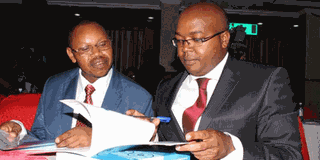Hospitals to use new TB testing kit in war against disease

Devolution Principal Secretary Saitoti Torome (left ) and Health Principal Secretary Nicholas Muraguri at the KICC on January 14,2016 during the launch of the 2014 Kenya Demographic and Health Survey. PHOTO | EVANS HABIL |
What you need to know:
A new directive will see the ministry introduce the use of GeneXpert, as the first line test to find out if a person is infected with TB.
Besides testing for ordinary TB, the GeneXpert also detects if the TB bacteria has resistance to one of the common drugs known as rifampicin.
Hospitals will from July use a more advanced technology to detect suspected tuberculosis in patients, the Ministry of Health has said.
This directive will see the ministry introduce the use of GeneXpert, as the first line test to find out if a person is infected with TB.
The first and common diagnosis for TB usually includes taking a chest x-ray and examining a suspected person’s sputum under a microscope.
Now, health facilities across the country will have to test for TB using the automated method, which detects presence of the TB bacteria faster and provides results within two hours.
Besides testing for ordinary TB, the GeneXpert also detects if the TB bacteria has resistance to one of the common drugs known as rifampicin.
Fronting it as having the potential to revolutionise and transform TB care and control in the country, Health Principal Secretary Nicholas Muraguri said the test would be the first to be conducted for all people suspected to have TB.
“We will be using this test in facilities where the equipment has been placed,” said Dr Muraguri during celebrations to mark the World TB Day yesterday.
He went on: “This machine will help us capture the cases at an early stage and reduce the number of cases that go undetected.”
Speaking at the same event, Head of National TB Unit Enos Masini said the equipment, introduced for TB testing in 2011, is already being used in 129 hospitals across the country.
“We expect 20 additional machines before the end of the year and gradually by 2017 we hope to have 250 more machines,” said Dr Masini.
The GeneXpert machine costs about Sh5 million and is said to be up to 80 per cent accurate. Unlike a microscope, a basic GeneXpert machine can run up to four tests simultaneously while a large one runs up to 16. In 2015, 80,000 people suspected to have TB were tested using the GeneXpert, from which 15,000 tested positive for ordinary TB while another 436 were found to have drug resistant TB.
“It is a cost effective method which helps us detect the bacteria fast. All the person has to do is give sputum, which is put in a testing tube and automatically run by the machine. The laboratory technician does very little with this machine,” added Dr Masini.
Besides testing for TB, the GeneXpert can be used to check the viral load for HIV positive patients as well as detect cancer.





